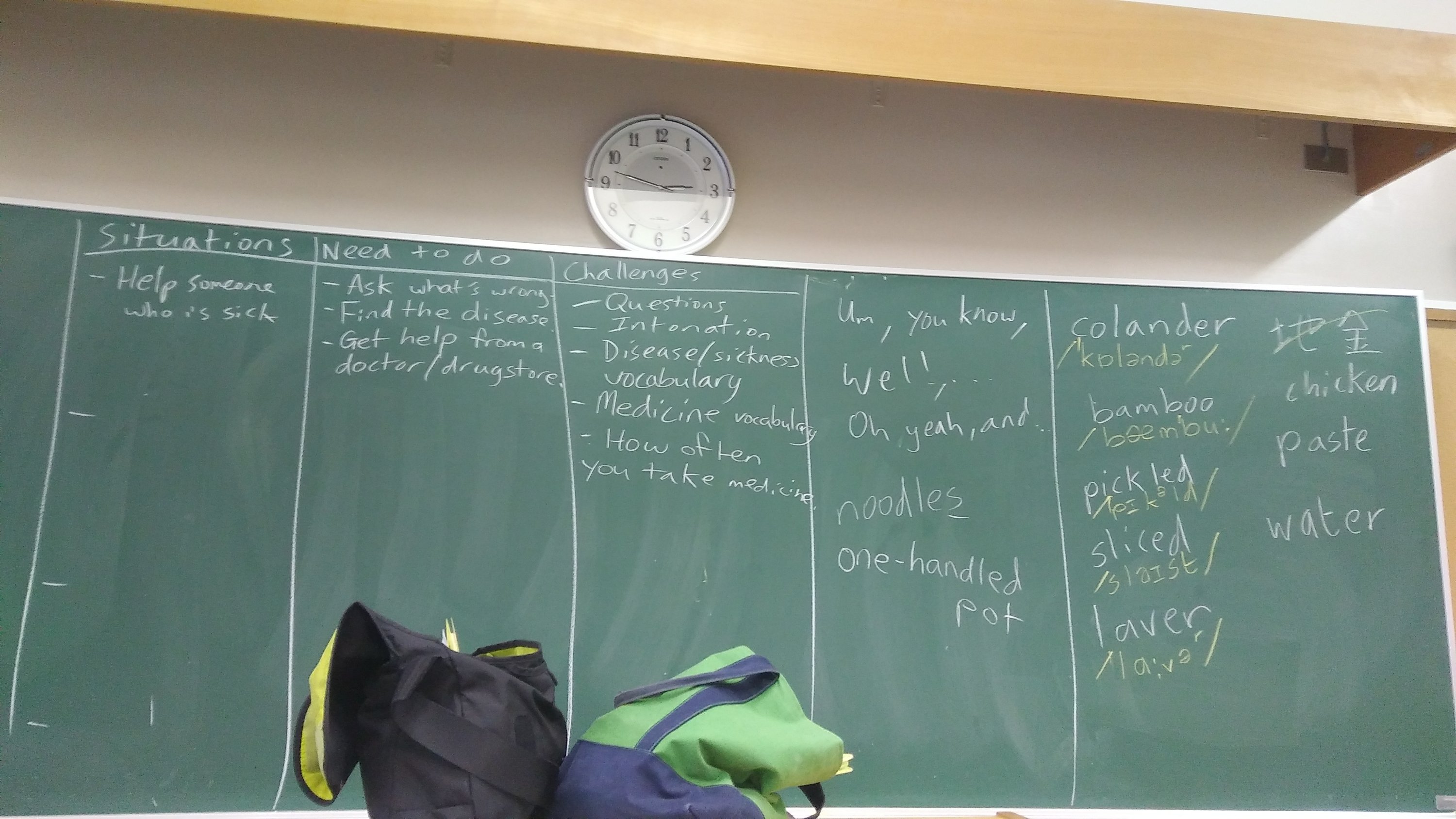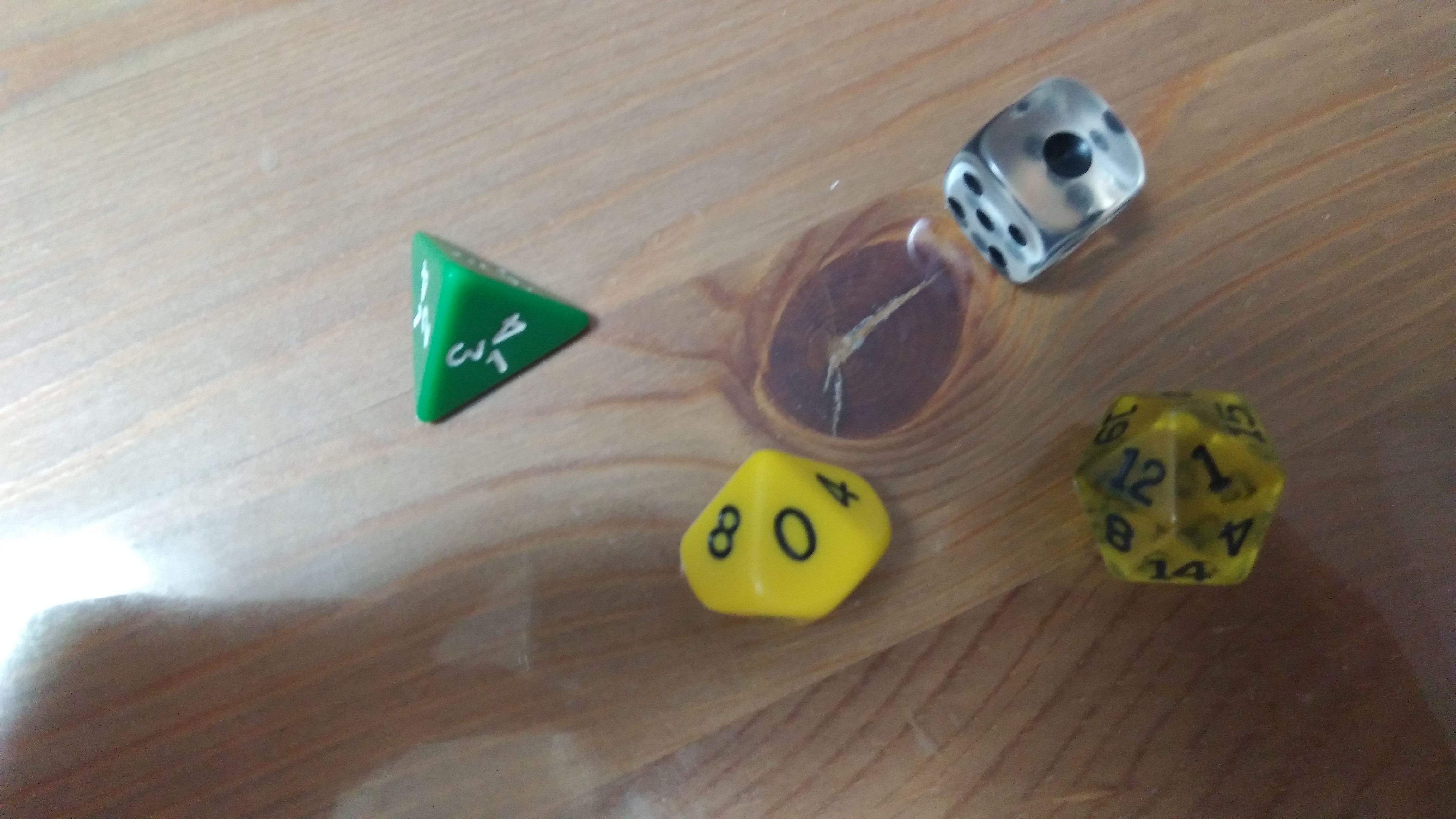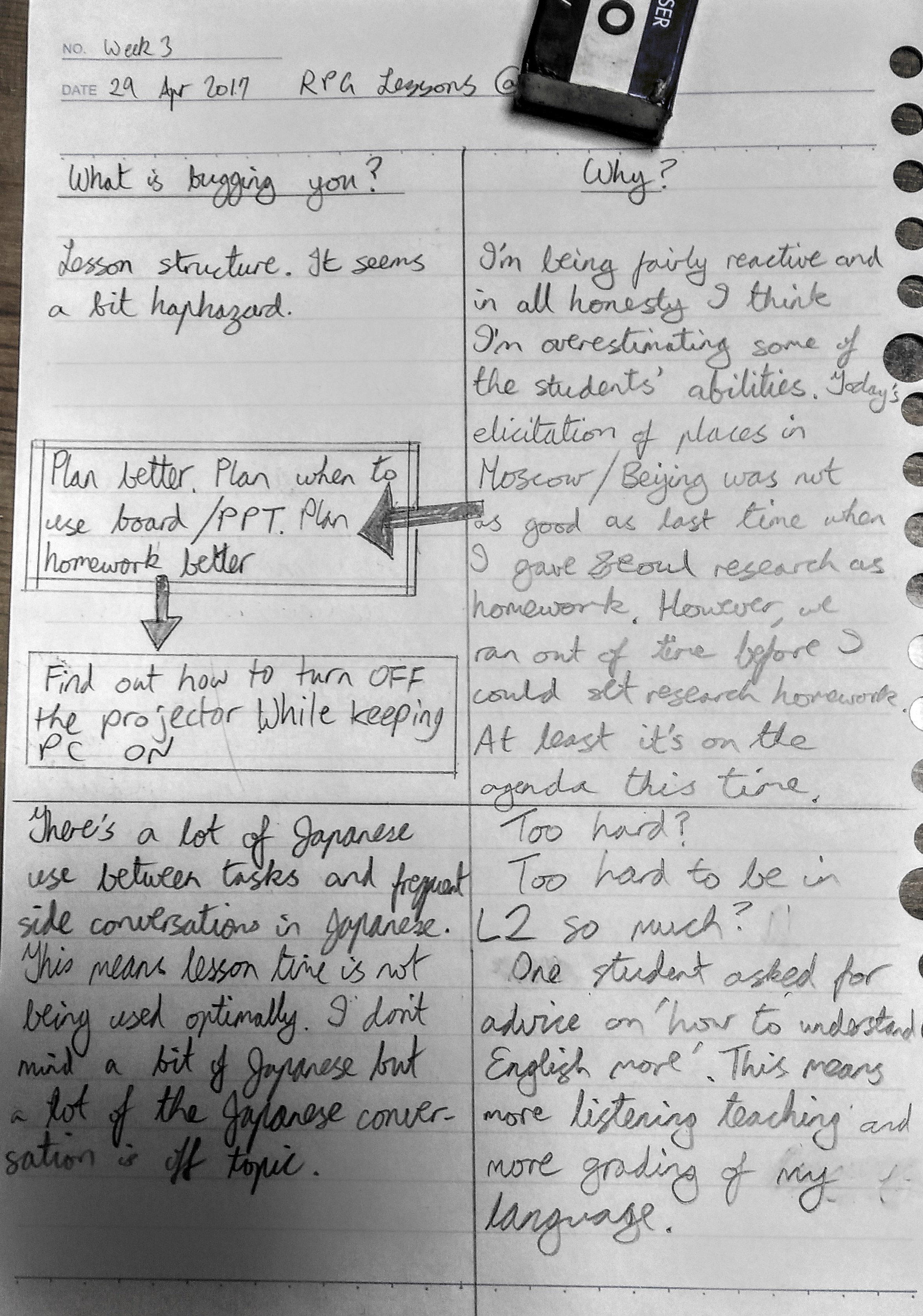You are in a classroom. There is a dais with a desk, behind which there is a blackboard. In front of you there are eight novices awaiting instruction.
I choose to engage the novices.
Go ahead.
Today, I have a plan. However, I am interested to know if you have a different plan. My plan can be for another day. Please imagine different situations that you and Rob or Vanessa (our regular Non-Player Characters) might be in. Use last week’s lesson as a planning guide. If you need help, please ask me.
Roll D10>3 and D4<4 for successful engagement and +1 courage.
D10=7,
D4 falls off desk… =1.
It went really well, actually. The students planned in two groups of 4. One group decided on explaining a road relay (and did very well indeed), and the other planned to teach how to make miso soup, which they underestimated the complexity of, but I see this as a good learning experience. I also think that by giving my students a metaphorical look behind the curtain that they can understand the success criteria for the tasks I create a bit better. I would still like a bit more linguistic complexity in their output, but today I am going to take this as a success.
XP +D6
D6=4.
Read Here be (Dungeons and) Dragons previous ‘chapters’: 1, 2, 3, 4, 5, 6, 7, 8, 9.
Tag: RPG
Here be (Dungeons and) Dragons 9

Fin de siecle
At the University of Outside Tokyo my English repeaters have just finished their first RPG. It has, at times, been immensely frustrating due to my own idealism. Surely everyone would love to attend an English course for university if it were structured as a Role-Playing Game! It does not quite work like that, and despite a large improvement in attendance, it appears that I am likely to have students who fail due to lack of work through non-attendance.
I am assessing the course based on participation and quality interaction in the lessons, as well as through a reflective portfolio where students analyse the problems in their roleplays and identify root causes and potential solutions.
However, those that came showed great positivity despite not feeling fond of communicating using English. This is my reward, after dreaming up scenarios, some richer than others, for my students to roleplay through and cast D20s upon.
I am assessing the course based on participation and quality interaction in the lessons, as well as through a reflective portfolio where students analyse the problems in their roleplays and identify root causes and potential solutions. This is done by using recordings to assist in recall. It is essentially cribbed and adapted from James York’s Kotoba Rollers framework. Mostly the portfolios are OK with flashes of brilliant insight. The last class today as used as a portfolio workshop for my students to complete their portfolios. As they worked, the appearance and reappearance of eureka expressions on their faces were my reward. And it is these eureka moments that I hope the students remember, rather than brightly-colored, odd-shaped dice.
Read Here be (Dungeons and) Dragons previous ‘chapters’: 1, 2, 3, 4, 5, 6, 7, 8
Here be (Dungeons and) Dragons 8

We’re almost near the end of the first term of my RPG classes and I’m already looking forward to the summative assessment. This is because the students at Ladies’ College of Suburban Tokyo are amazingly motivated for the most part and because the students at University of Outside Tokyo are repeaters who had to retake English Communication, and have shown a great deal of motivation, too, or at least the students who come regularly. My supervising professor at UOT has told me that if one third of the students pass, then that ought to be seen as a success. As it stands, we should be on for 4 definites, 5 probables and 3 unlikelies. At LCST, all the students should pass because everyone does the work, even if it is not always amazing it is always done.
I managed to ask some of the students at UOT the other day if they actually like the course as a game and they said yes. (Of course, they did. They won’t tell you it’s crap because you grade them, Marc.)
What negatives I did get were that one student said he didn’t like recording himself because it was a pain in the arse; however, this student also finds attendance a pain in the arse, too. My most regular attendee said recordings were difficult to manage. This is why I told him to make sure he kept a copy and also sent a copy to me.
Anyway, long story short: still loving it, waiting to see portfolios, deal with the recordings.
I am also giving a workshop on this at JALT Saitama’s Nakasendo conference on Sunday. I have presented before but never run a workshop for more than six teachers at once before. If you read this say hello!
Read Here be (Dungeons and) Dragons previous ‘chapters’: 1, 2, 3, 4, 5, 6, 7
Here Be (Dungeons and) Dragons: 7
Back to the Campaign

I’m not satisfied with the RPG courses at the moment but I can see what it is that I want. I want to be able to just put everything in place like I have five years experience of RPGs rather than feeling my way blind.
So what would I do with all my unearned experience? Well, I think I would like to delegate some of the Dungeon Master responsibilities to the students. Learner Autonomy is a good thing. The only problem is only about a handful are capable of putting together a scenario and scoring. Because Japan is a groupist culture, this means I would run the risk of putting noses out of joint.
Another thing that I hadn’t thought through properly is item functions. The class at UOT has won some items but LCST has had no items in the game, yet. I was considering using these items to fiddle the game and let conscientious learners get high scores but in all honesty all the students are conscientious enough to keep me happy. Still, a few things could make it more interesting.
So what I am going to do is add items in the next few stages and have clear benefits to them.
I will ask of anyone wants Dungeon Master homework. I might even make a tutorial video about using Google Slides, too.
Read Here be (Dungeons and) Dragons previous ‘chapters’: 1, 2, 3, 4, 5, 6
Here be (Dungeons and) Dragons 6: Interlude

Interlude, or stopping the game and assessing.
Who’s assessing?
Well, funny you should say that. At Ladies College of Suburban Tokyo (LCST) I went around two classes of twenty odd, checking portfolios in progress while the students planned repeat tasks. I assigned them to re-record the most difficult task of the last 4 weeks, listen to the new one, listen to the previous one and judge which is better and how or why? Also, it gives a chance to see what still needs to be done. These students are a bit more savvy with academic skills as well as IT, and I don’t have access to a CALL room so I didn’t run a lesson on PowerPoint and OneNote or Google Apps to collate work.
The students’ work outside class has been a good mix of practice with elllo.org and dreamreader.net but also a lot of indiscriminate grammar drills from high-school textbooks, despite my urge to study grammar from graded readers, listening or something with a lot of context or cotext.
At University Outside Tokyo (UOT), I had more students than usual after a prompt of “come to class or face failing again”. Some students were savvy, others not so. I showed how to use PowerPoint to gather pictures and annotate them for vocabulary and how to drag and drop multimedia files. I was hoping this would take about 50 minutes but young people in Japan, while mobile literate are sometimes not very computer literate. They’ll redo tasks at the start of the next lesson.
At least I know now what the demands are, how much time it takes me to get around everyone to give feedback and the students know to make better use of grammar drills and such.
Read Here be (Dungeons and) Dragons previous ‘chapters’: 1, 2, 3, 4, 5
Here be (Dungeons and) Dragons 5
The crap lesson
This week at LCST the task was to ask which metro station a sightseeing spot is near. Unfortunately the lesson wasn’t very good. The first steps of the task were very poor. It wasn’t helped by assuming students would be able to just ask where a foreign place is. The complexity of the task needed to be thought about first.
I suppose this needs to be key in task design. Perhaps a task design process should be considered. A preliminary idea is:
Task Design Process
-
Idea
-
What language functions are necessary?
-
What different skills are needed?
-
What is likely to occur?
-
What can be done to scaffold to enable best-case scenarios?
-
Review
-
Check what could go wrong at each step.
So, anyway, after a focus on form on questions and longer answers, I’d say the task was finally done well, but I’ll check over everything so far in next week’s review lesson.
Read Here be (Dungeons and) Dragons previous ‘chapters’: 1, 2, 3, 4
Read the future chapters 6
Here be (Dungeons and) Dragons 4
Here be (Dungeons and) Dragons 3
The Wrath of the Math
“Huh?”
“Your points are 2 for taking a taxi, plus 1 if you told the driver where exactly to let you out. Then roll the D4. Add courage points to the D4. Divide them by 5.”
I should have seen this coming. How often do you see any English for arithmetic in EFL materials? Never. How many of these ladies at Ladies’ College of Suburban Tokyo (LCST) have played RPGs before? None, so the D4 terminology from the first lesson went in one ear and out the other of some students.
Next time I will provide a little bit of Focus on Form on the arithmetic terms and hope that our dining role plays go well, because other than the maths, it was a good lesson.
Read Here be (Dungeons and) Dragons previous ‘chapters’: 1, 2
Read the future chapters 4, 5, 6
Here be (Dungeons and) Dragons 2

With last week’s descent into the ‘dungeon’ being somewhat gung-ho, this week was a wake-up call. The group at University Outside Tokyo (UOT) changed. Our one woman was absent along with two other male players. Perhaps this is what led to one player stepping over the line or testing the boundaries of what is and isn’t acceptable in the classroom.
Our game at UOT is based on interacting with a non-player character (NPC) who is a foreign exchange student. This week we took him sightseeing (with our female player absent only our male NPC was in play). Unfortunately three of the players decided that a good place would be a massage parlour.
There was part of me that was close to ranting and raving. However, I didn’t. Instead, I appealed to the group’s lack of impropriety and asked if this was acceptable to them. It wasn’t. We finished the game, and after the transcription stage I called bullshit. I pulled rank as both ‘Dungeon Master’ and classroom teacher. Yes, I played my ‘Don’t be a dick!’ and ‘I grade your work’ cards. Do I feel slightly uncomfortable setting boundaries with adults? Yes, actually. Am I glad I did it? Absolutely.
There is a public transport-themed game stage next lesson with this group. I don’t think this will provide opportunities for lewd outbursts.
Read Here be (Dungeons and) Dragons previous ‘chapters’: 1,
Read the future chapters 3, 4, 5, 6
Here be (Dungeons and) Dragons 1
First day back at A University Outside Tokyo today. All new courses as I decided to rewrite the one course that was the same.
Anyway, I have a course for repeating students. I requested this for the challenge and thought it would give me a chance to try new things to up motivation.

15-week role-playing game based roughly on a Dungeons & Dragons-type game mechanic? Based on welcoming an exchange student? Let’s enter the dungeon.
It’s very much a Role Playing course, with a minor game put in. It’s sort of a hybrid of Daniel Brown’s EFL RPGs and James York’s Kotoba Rollers framework. The students have (electronic) portfolios to submit, which should include audio recordings of role plays, transcriptions of part of that audio, vocabulary and grammar notes.
It’s just the first week but the students seem relatively enthusiastic, especially with the 20-sided, 10-sided and 4-sided dice.
The non-player characters (exchange students, parents, etc.) are not played by a Dungeon Master (teacher) but by the students and decided by values of dice rolls. There is a bit of task planning, task recording and task reflection, as well as focus on form reactively.
I still need to work in more about the strength, courage, observation and stamina points more clearly in my mind but at least it wasn’t rejected point blank.
Read Here be (Dungeons and) Dragons future’chapters’: 2, 3, 4, 5, 6

